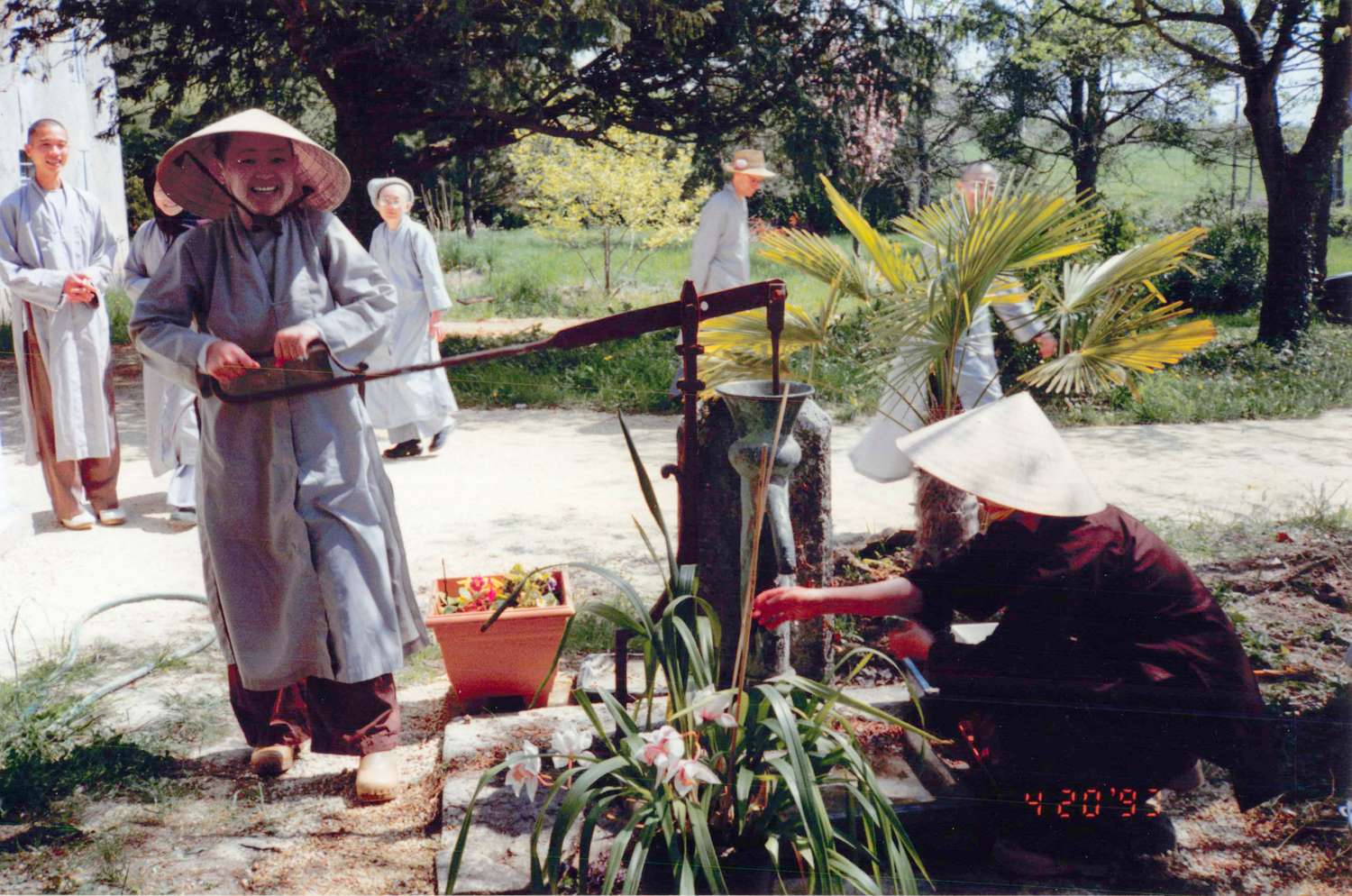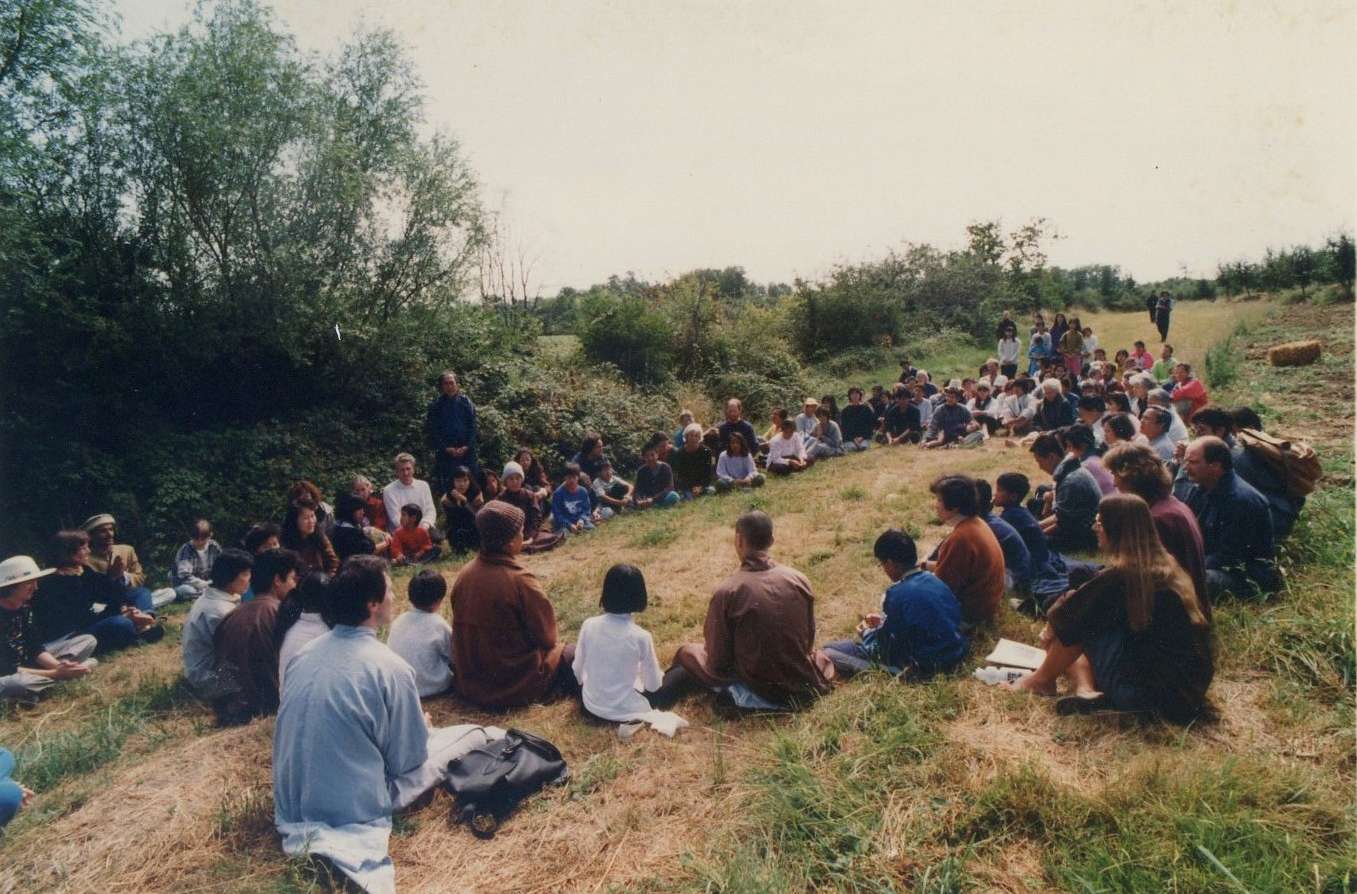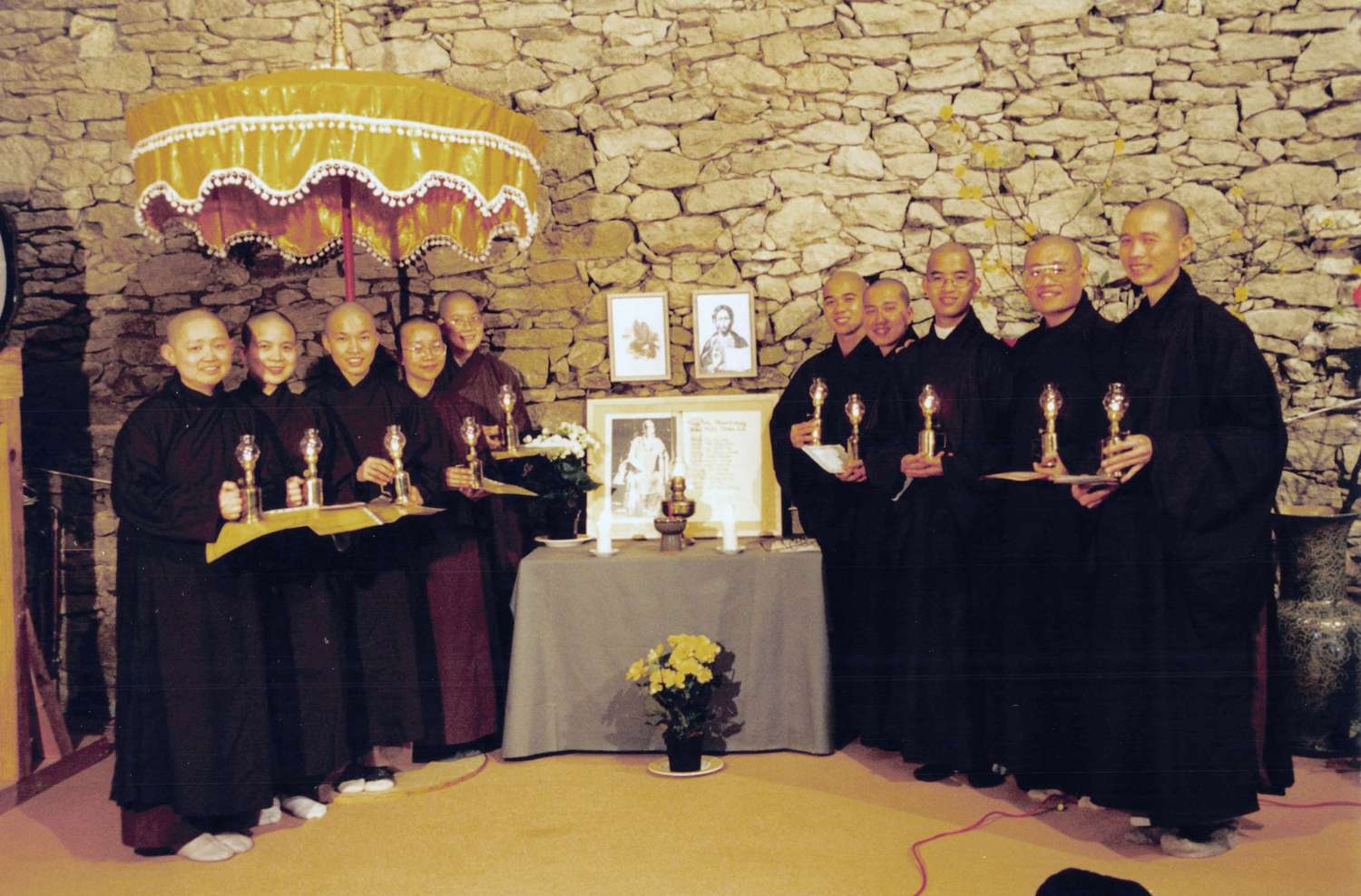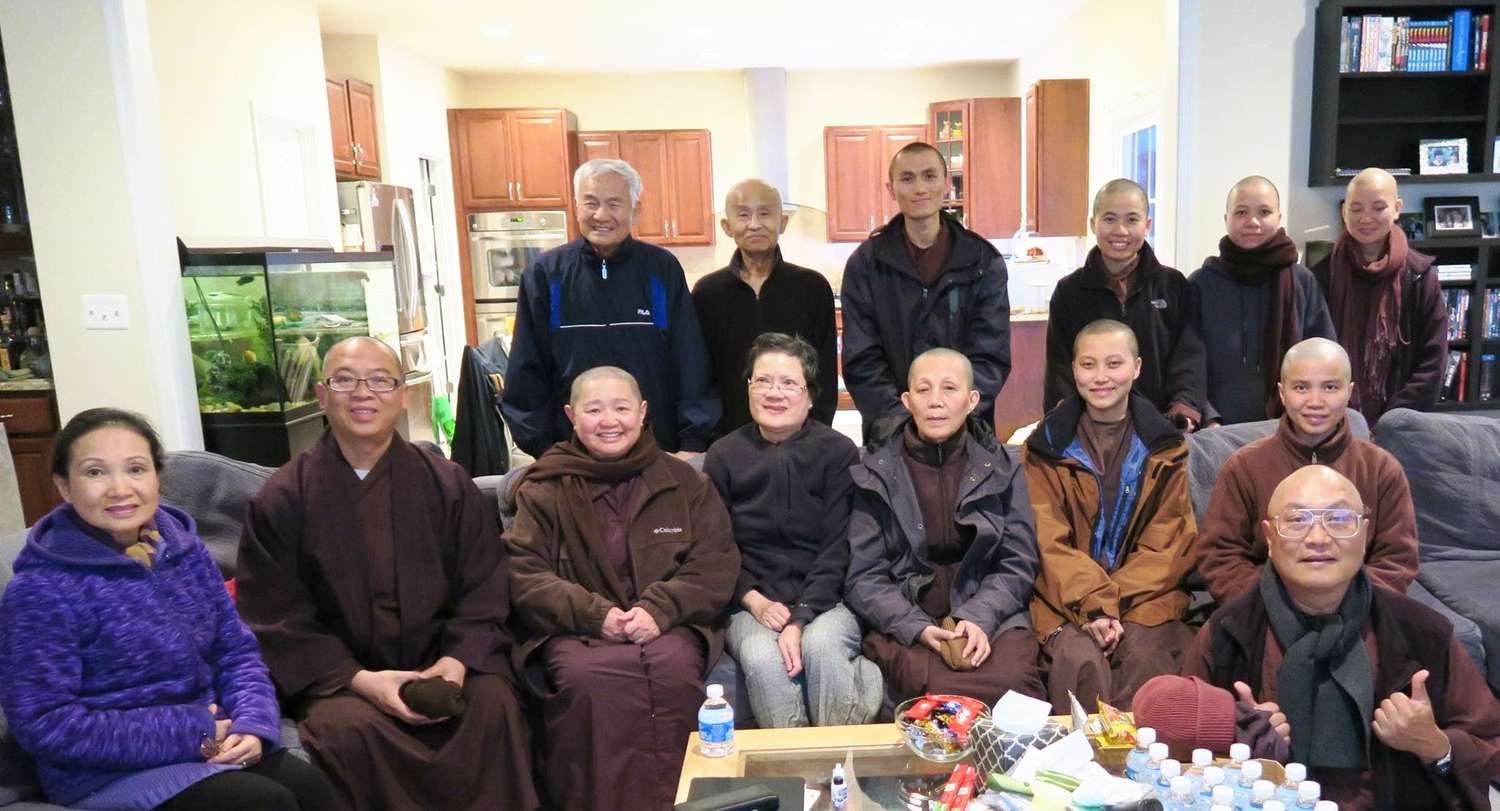A Box of LU Biscuits
Sister Chân Hoa Nghiêm
A life of practice
Plum Village in the 1980s and 1990s was like a rural village, still very rustic. There were very few people there and life was quite simple. Our room only had a table and a bed. The bed was nothing but a plank of wood on top of four bricks. On my ordination day, my elder sister, Sister Doan Nghiem, offered me a set of faded brown short robes. I also received a top from Sr. Vien Quang and a pair of pants from Sr. Chan Vi so I could have another complete set of short robes. Thay also gave me one grey long robe, which I liked very much. At that time, I was only half my current age. I was young and full of spirit. I was quite active and eager to do everything. I volunteered to work in the garden because our food was very basic then and we ate what we planted in the garden–but I was born and raised in the city so gardening was something very new to me. I followed Sr. Chan Vi to learn how to garden. We were so keen on digging the soil that we even skipped evening sitting meditation sessions. Sr. Chan Vi and I were scolded by Sr. Thanh Luong: “You are here to practice, not to work!” We immediately went to her to begin anew because she was our eldest sister at the time.

Compassion for all living beings
When the seeds of the pumpkins and tomatoes germinated, I was besotted with the baby plants, and watched them grow every day. On lazy days, my elder sister, Sr. Bao Nghiem woke me up at 6 a.m. so that I could go with her and Sr. Chan Vi to the garden to catch slugs. Like snails, slugs really like to eat young pumpkin, squash and other vegetable plants. It only took a slug one morning to chew up a young pumpkin plant, negating all our hard work of two spring months to sow the seeds and water the plants. One morning like that, we could fill up a whole jar with slugs. Sr. Chan Vi looked at me, smiling, “Hoa Nghiem, now we bring them to a new economic-zone.” I looked back at her, surprised, “Where would that new economic-zone be?” She laughed out loud, “We will bring them to the woods. There they don’t have vegetables to eat, they will eat only grass.” I realized then what she meant. I reckoned it was better that they ate grass instead of being killed. There were gardeners who sprayed pesticides on the young plants and vegetables. Without knowing it, slugs ate the sprayed plants and burst their bellies and died. Thay often told us that we could share half of the vegetables with the slugs and eat only half ourselves rather than killing them, as it would be too painful to do so. Compassion taught us to love all species, all living beings.
Learning from Thay
When Thay was not away for teaching tours in the U.S., we were very happy. In those days, Thay often came to Lower Hamlet and taught us the monastic mindful manners. Things like, when sweeping the floor, we should not raise the broom too high because doing so would stir up the dust everywhere. Or when eating, we should keep our head straight up and not bent over, etc. Thay also taught us how to write poetry. Ms. Tinh Thuy and Br. Vo Ngai were the quickest learners among us. Soon after Thay finished his teaching, they already submitted their newly composed poems. Thay then taught us how to edit their poems to make them rhyme better. Each time Thay came to Lower Hamlet, we were so happy as if it was a festival. These sweet, beautiful memories, they are endless! All of them have nourished my bodhicitta until now.
Learning to cook
During the summer retreats, so many people came to practice. In the old days, Lower Hamlet was reserved for Vietnamese practitioners. In the first Summer Retreat I joined as a novice nun, my responsibility was to help Sr. Chan Khong to organize tea meditation sessions. I checked the registration list and made invitation letters for the tea sessions, and then prepared tea cups and took care of the work of the tea attendant. I did this for the whole Summer Retreat. Besides that, I also helped Ms. Tinh Thuy in the bookshop and joined the cooking team with Thanh Tuyen (now Sr. Huong Nghiem). Having just ordained, how could I know how to cook for that many people? At that time we hosted sixty, seventy or even a hundred lay friends each week.
Before the Summer Retreat, Sr. Thanh Luong already trained us in cooking. Which pot should we use to cook for fifty to a hundred people? How many knives and cutting boards should we prepare for lay friends to help us cut vegetables during mindful service time? Thanh Tuyen and I were on the same team. We discussed and planned that we would cook the same dishes every week. We thought that each week new friends came and no one would know! Only the sisters complained. Sr. Chan Vi said, “Every time you two cook, you do the same old thing. Don’t you get bored?” I replied quietly in my head–Only once a week, how could anyone get bored? I don’t really remember what dishes they were but I still remember my favorite dish, which was black bean porridge topped with coconut milk and salted roasted-peanuts for the evening meal. I cooked that dish every week when it was my turn.


There were weeks when many Vietnamese people came. Thanh Tuyen arranged for the aunties (the elder women) to stay in my room. I once shared the room with seven of them. I was quite happy. Sharing the room with them I could listen to stories about their families and children. I felt very fortunate that I took the monastic path; otherwise I would have suffered as much as they did at the time.
The simple life
In a little forest near Lower Hamlet there is a creek with crystal-clear water. The trees in the forest were very beautiful; their branches leaned on one another just like us in the sangha. After the Summer Retreat we would normally have a ten-day lazy period. On these lazy days I often packed a little sac with a piece of bread, a banana, and a thermos filled with hot water. Walking into the woods, I would find a clearing to spread out a sitting mat. I practiced sitting meditation and then ate my lunch there. After that I took a long nap until the afternoon set in, then I cleaned up and went back to the hamlet. My novice nun experience in the old days was really pure–only practice, nothing else.
In the old days of Plum Village, we only interacted with lay friends who came to practice with us. When they came here they only focused on the practice and followed the schedule. That was why we had very limited contact with the outside world. News of the world about politics or incidents of violence, etc., have never once appeared in my mind, let alone my imagination. Each month we received a modest amount of pocket money that was enough to buy personal hygiene items, or a notebook to write down the teachings from Thay, or sometimes a box of LU biscuits, which would be saved for moments of sweet craving. The word “donation” was really foreign to me. After so many years staying in Plum Village, I only received a donation one time and the amount was equivalent to five or ten dollars. I always said to myself–I didn’t become a monastic to look for donations. Thay taught us in a monastic retreat: The purpose of a monastic is not for receiving food and clothing. It is also not to look for material comfort. The practice of Plum Village is to generate happiness.
In the old days when there was no internet, or iPhones, iPads, computers etc., communication through technology was limited and people did not have many fears or worries. Today however, the more modern and expansive the means of communication, the more people like to amass information. Most of the time however, this information brings us worry and suffering. Our lives become so busy without a moment of peace.
Leaving the nest
I still recall the day we celebrated twenty years of Plum Village. When Plum Village turned twenty, we were a little older in the Dharma and had already received the lamp transmission to become Dharma teachers. At that time, we were like young birds trained to fly from their warm nest. Thay assigned us with the task of going out to build Plum Village practice centers in Europe, America and Asia.
Now Plum Village is forty years old and we are also becoming middle-aged. Though the phenomena of birth and death, of change, are in the historical dimension, it is still time to prepare a place to return to. I always remind myself of that. My younger sister, Sr. Chi Nghiem, was already ahead of me.
The light and shade of impermanence
This morning, after many months of battling with cancer, Sr. Chi Nghiem waved her last goodbye to the sangha amidst the sound of us chanting the Buddha’s name. Conditions have ceased in this lifetime and when they converge again, she will manifest in a new, even more beautiful form.
When Deer Park Monastery was founded in California, Sr. Chi Nghiem followed Thay’s instruction to go there first and build it with other sisters. When Blue Cliff was founded in Upstate New York, she also volunteered to come here to support building the new sangha. She had never let Thay and the ancestral teachers down. In her last moments, she was at peace. Last night in the Purification Ceremony, Venerable Minh Tuan brought a dark yellow paper fan on which was painted a Zen circle with Thay’s calligraphy in it–My child, smile as you cross to the other shore.
Walking on the path to the Great Togetherness Meditation Hall, I saw the monks’ residence alight with beautiful colors. Christmas has arrived. My sisters have also turned on decorative lights in our quarters to celebrate Christmas. It feels so alive and joyful as if there had never been a funeral just a few days ago. The light and shade of time!
It seems like only yesterday that I saw Thay sitting on the podium teaching. It seems like only yesterday that I saw myself helping Thay put down fertilizer for the chrysanthemums. It seems like only yesterday that I saw myself together with a delegation walking behind Thay, ascending the Vulture Peak with mindful steps. All of that seems like a beautiful dream now. I have to accept the change in order to touch the unchangeable, which is the love between Thay and his disciples, brotherhood, and sisterhood and, bodhicitta. These will stay dear in my heart forever, in this life and for many lives to come.
